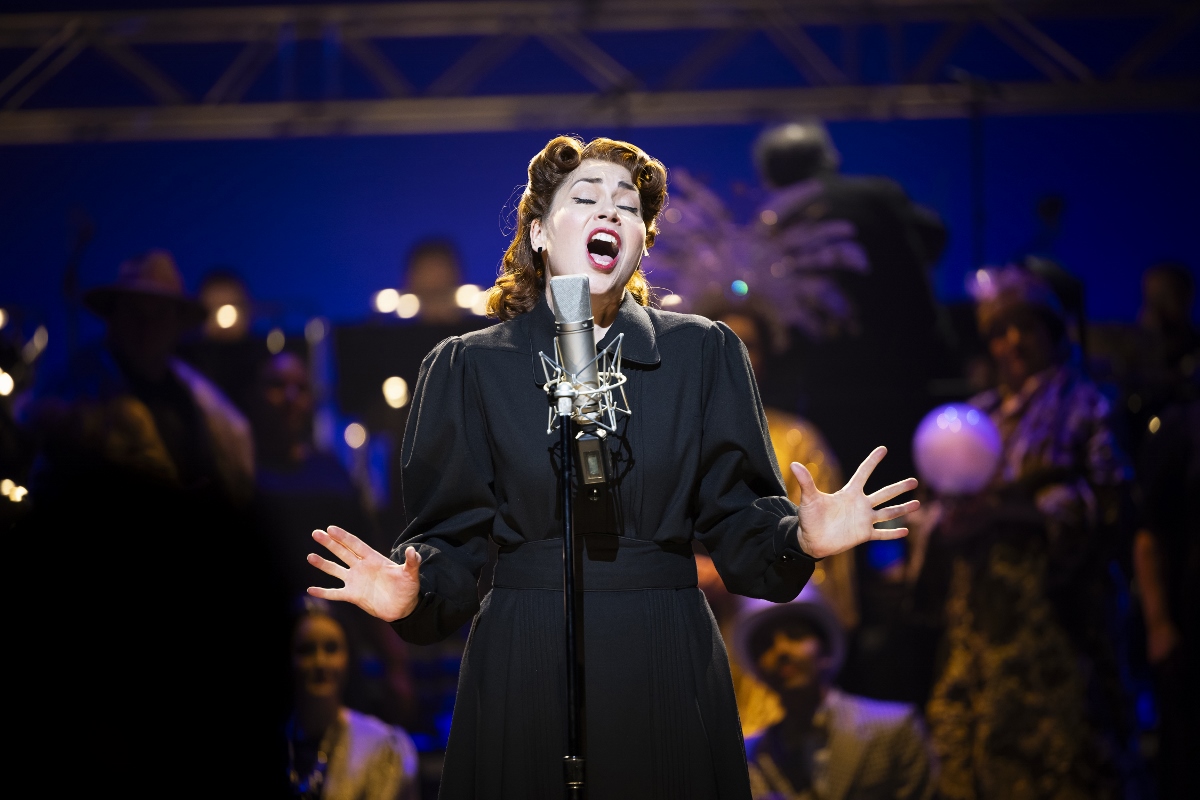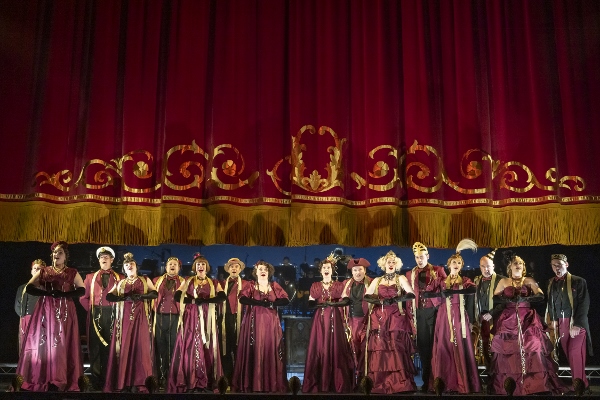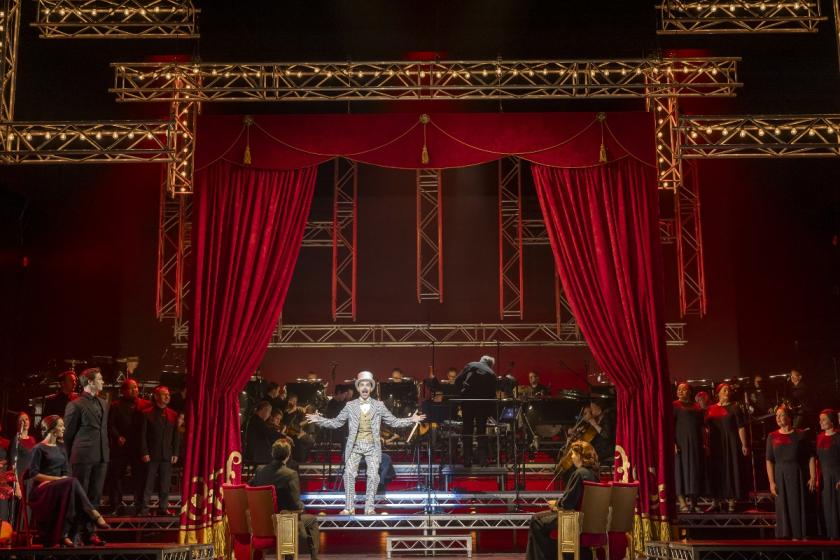The past is a foreign country: they do things differently there. But in Love Life, Kurt Weill and Alan Jay Lerner’s musical from 1948, it’s all the same country. The couple whose marriage is at the centre of it all are seen in different eras of US history, and while they hardly age, the country changes vastly.
It's an extraordinary piece for the Broadway of its time. Credited with being the first “concept musical”, it frames its story as a piece of vaudeville (by 1948 already a thing of the past), with a Magician whose act introduces Sam and Susan Cooper by having him suspended in the air and her sawn in half. Then it’s back to 1791, when the Revolution is still recent history and the new nation is being built. Successive landings of this time-travelling marriage land them in 1821, 1857, 1894, the 1920s and finally (the whole of the second part of the show) 1948.
That was the present when Love Life was written. For today’s audience it’s the long past, but Matthew Eberhardt’s production helps us think ourselves into that era. His Sam and Susan (Quirijn de Lang and Stephanie Corley) and their children (Louie Stow and Tilly Baker) are costumed in plain black, whatever the time frame, and so are the chorus when representing their contemporaries. For the vaudeville “acts” which punctuate their story, however, there are vivid and flamboyant costumes – set and costume design are by Zahra Mansouri, and the recurring visual theme is one of lighting “trusses” (the metal frameworks, often out of sight that support stage illumination) arranged in ever more complicated concatenations to accompany the complications of married life that, so the narrative tells us, have come with history’s “progress”.
The orchestra is centre stage, at the back, and that supplies the lack of any permanent set. It’s justified, too, by the fact that Weill’s dazzling score is in many ways the centrepiece of the whole exercise. This is in fact a recording project, in collaboration with the Kurt Weill Foundation, and its three performances in Leeds (remaining ones tonight and tomorrow) are all it’s getting for audiences to see. There never was an original cast recording of the Broadway production and this will be what sounds like the first definitive one.
Opera North has a relationship with the Kurt Weill Foundation going back to early 1996, when it last produced (and toured) Love Life, with Alan Oke and Margaret Preece in the leading roles, giving it its European premiere. Lys Simonette, then in her 70s, who had been Weill’s assistant musical director since 1945, after escaping with her family from the Nazis at the end of the previous decade, supervised its production. (Those were the days: in Manchester we had five performances in the week then, with two of Love Life, two of La Boheme and one of Verdi’s Luisa Miller. Tell that to Arts Council England when they say they want more opera outside London now.) The piece requires resources that few organisations could bring, and possibly only Opera North, with its large chorus body all capable of taking outstanding roles, could even attempt it today. James Holmes, long a vital member of their music team, is a Kurt Weill expert, and his conducting of the score is a delight (if the sound captured for the recording is as splendid as what was heard in the auditorium last night, credit is well deserved by all the musicians and the technical team as well).
The piece requires resources that few organisations could bring, and possibly only Opera North, with its large chorus body all capable of taking outstanding roles, could even attempt it today. James Holmes, long a vital member of their music team, is a Kurt Weill expert, and his conducting of the score is a delight (if the sound captured for the recording is as splendid as what was heard in the auditorium last night, credit is well deserved by all the musicians and the technical team as well).
In such a large cast list, it’s hard to mention anyone without emphasizing the qualities shared by all. Stephanie Corley (pictured above) and Quirijn de Lang have the lions’ share of the stage time, of course, and present their Everyman and Everywoman roles, in sweet and sourer times, with immediacy and honesty while singing superbly: his rich baritone is in resonant form, and she never falters in a wide range of styles. Louie Stow and Tilly Baker carry a significant acting task off very effectively, too.
Zambian baritone Themba Mvula opens the show with captivating life; Justin Hopkins (a Kurt Weill/Lotte Lenya Artist, who’s also appearing as Sarastro in Opera North’s revival of The Magic Flute over the coming weeks) is magnificent as the Hobo in the haunting “Love Song”.
The other highlights of the “vaudeville” are all ensembles. The male octet’s hymn to “Progress”, early on, is both brilliantly sung and also well danced (the choreography credit is to Will Tuckett, which says much about the care that’s been lavished on this show, though for only three outings). There’s an outstanding male quartet who appear first in comic barbershop style in “Economics” and later as angels in “Susan’s Dream” (Will Hopkins, Joshua da Costa, Andrew Randall and Masimba Ushe); there are three very feisty young performers in “Mother’s getting nervous” (Felicity Moore, Amber Midgley and Lottie Gray), and there are two accomplished dancers in Holly Saw and Max Westwell, whose “Divorce Ballet” (yes, there’s a second-half ballet in this show as Broadway required at the time) actually draws in several talented movers from the chorus, too.
The “Minstrel Show” near the end of the story features Themba Mvula, Charlie Drummond, Helen Évora, Tom Smith and Claire Lees (the latter four all Opera North Chorus members) to great effect, but the highlight of the whole for me was the “Ho, Billy O !” number for a supposed troupe of Madrigal Singers – for whom Weill supplies an extended piece of pastiche unaccompanied part-song – which employs the varied vocal and performing talents of that Chorus to the full (pictured below).  There isn’t much more in the way of direct pastiche or parody in the score (Weill was too much a man of his own time to set much store by that), but his never-failing gift for melodic inflection saturates it, and he brings his awareness of the bluesy harmonies and suavely seductive style of 1940s Broadway to almost every number with just a nod to historical parallels.
There isn’t much more in the way of direct pastiche or parody in the score (Weill was too much a man of his own time to set much store by that), but his never-failing gift for melodic inflection saturates it, and he brings his awareness of the bluesy harmonies and suavely seductive style of 1940s Broadway to almost every number with just a nod to historical parallels.
The story itself is a sad one – something that puts this musical into a pretty exclusive mid-twentieth century league – as Sam and Susan decide, in 1948, that their marriage is over, and sign divorce papers. And yet they can’t live without each other: it ends (after the emptiness of the “Illusion Minstrel Show” is exposed) with a decision to try once more – “Susan, we’ve got to find a true song”, Sam sings … before they try to walk a (literal) tightrope of hope. And then it’s over. Write your own ending, folks.
Alan Jay Lerner knew about failure in marriage: he had eight of them. Writing only two years before his death, Kurt Weill knew about bitter-sweet relationships, too. What they created is one of a kind, and in this case brilliantly reconstructed, if only for a weekend.














Add comment